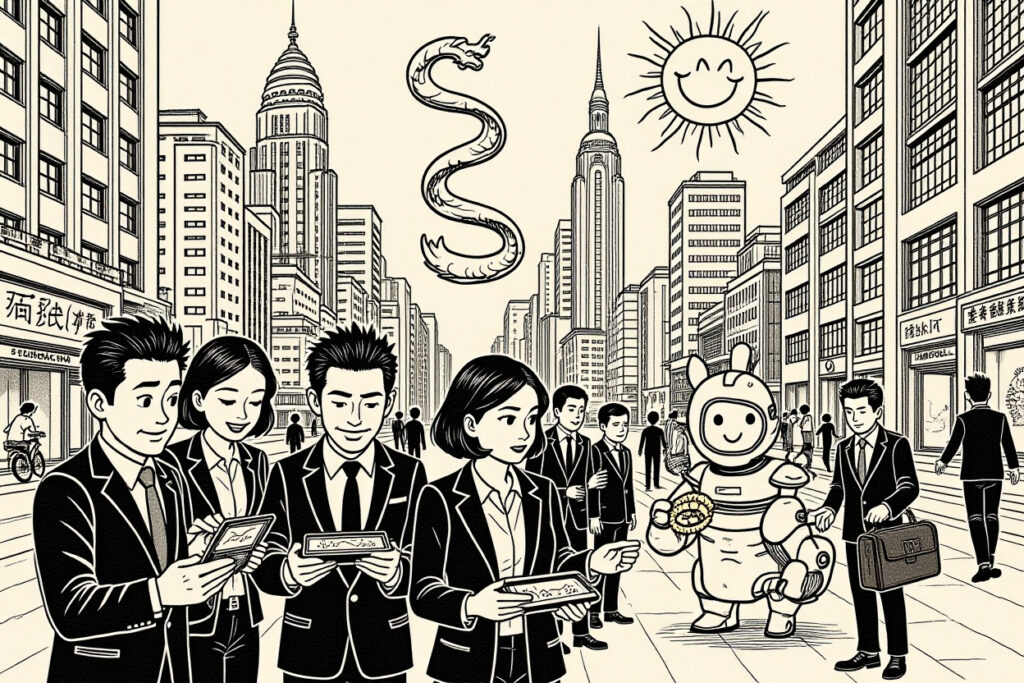Summary
Here are the key points covered in this analysis:
– Oriental Selection’s shares experienced a dramatic 20.89% drop on August 19, 2025, following market rumors about CEO Zhou Chenggang
– The company swiftly responded with an official denial and announced it had initiated police and judicial procedures against rumor-mongers
– The stock had previously reached a near two-year high of HK$53.7, making the sudden plunge particularly noteworthy
– This incident highlights the vulnerability of Chinese stocks to rumor-driven volatility and the importance of corporate response mechanisms
– Regulatory frameworks in Hong Kong’s financial market provide specific channels for addressing market manipulation through false information
The Sudden Market Plunge
On August 19, 2025, investors in Oriental Selection Holdings Limited experienced a dramatic reversal of fortunes. The company’s stock, which had been performing strongly throughout the trading session, suddenly plummeted during the final hours of trading on the Hong Kong Stock Exchange. From a position of strength that saw shares reach HK$53.7 – a near two-year high representing gains of over 23.5% – the stock collapsed to close at HK$34.32, representing a staggering single-day loss of 20.89%.
This violent market movement erased approximately HK$8.5 billion in market capitalization within hours, catching many investors by surprise. The timing was particularly notable as it occurred during the tail end of the trading session, when liquidity typically diminishes and price movements can become exaggerated. Market participants initially scrambled to identify the catalyst for such a severe price correction in a stock that had shown considerable strength throughout most of the trading day.
Trading Volume Patterns
Analysis of trading data revealed unusually high volume during the sell-off period, with over 28 million shares changing hands in the final hour alone. This represented nearly 40% of the day’s total volume and suggested coordinated selling pressure rather than organic profit-taking. The velocity of the decline indicated that automated trading systems and stop-loss orders likely exacerbated the downward momentum once the initial selling began.
The Rumor That Triggered the Collapse
Market sources quickly identified the catalyst for the sudden sell-off: unverified rumors circulating through trading desks and social media platforms regarding Oriental Selection’s CEO Zhou Chenggang. While the exact nature of these rumors remains unspecified in official channels, financial industry insiders suggested they involved potential regulatory issues or personal matters that might affect Zhou’s ability to continue leading the company effectively.
In China’s financial markets, rumors about executive leadership can have particularly severe consequences due to the perceived importance of strong leadership in navigating the complex regulatory environment. Zhou Chenggang, as CEO of both Oriental Selection and its parent company New Oriental Education & Technology Group, represents a key leadership figure whose continuity is considered crucial to corporate strategy execution.
The Anatomy of Market Rumors
Financial market rumors typically follow predictable patterns in their dissemination. They often originate from anonymous sources on social media or private messaging groups before spreading to professional trading desks and eventually reaching mainstream financial news outlets. The Oriental Selection rumor appeared to follow this trajectory, with initial mentions appearing on Chinese social media platform Weibo approximately 90 minutes before the steepest decline in share price occurred.
The rapid spread was facilitated by the interconnected nature of modern financial communication systems, where automated news scanners and social media monitoring tools can amplify unverified information across global trading networks within seconds. This creates particular challenges for companies like Oriental Selection that must respond to information crises in real-time while complying with disclosure regulations.
Oriental Selection’s Swift Response
Within hours of the market close, Oriental Selection issued an official statement addressing the situation directly. The company’s communication team demonstrated crisis management efficiency by releasing a comprehensive denial that specifically mentioned the initiation of legal procedures. The statement read: “Regarding the market rumors, the company has initiated police and judicial procedures. We sternly condemn the spreading of false information that disrupts market order and damages shareholder interests.”
This response was significant for several reasons. First, it came exceptionally quickly by corporate standards – many companies take much longer to formulate responses to market rumors. Second, it specifically mentioned involving both law enforcement (police procedures) and the judicial system, indicating a serious approach to pursuing the sources of the rumors. Third, it framed the issue not just as a company-specific matter but as one affecting broader market integrity.
Legal Framework for Response
Oriental Selection’s reference to initiating police and judicial procedures operates within a specific legal context. Chinese securities law prohibits the spread of false information that could significantly impact securities prices. The Securities Law of the People’s Republic of China Article 56 explicitly forbids manipulating markets through spreading false information, with penalties including confiscation of illegal gains and fines between one and ten times the illegal gains.
Additionally, Hong Kong’s Securities and Futures Ordinance contains similar provisions, with Section 300 specifically addressing false information likely to affect securities prices. The company’s decision to involve both mainland Chinese authorities (police) and Hong Kong’s judicial system reflects the cross-border nature of its operations and shareholder base.
Market Impact and Investor Consequences
The sudden plunge in Oriental Selection’s stock price created significant consequences for various market participants. Retail investors who had purchased shares during the day’s rally found themselves facing immediate substantial losses. Institutional investors with large positions were forced to reassess their valuation models and risk exposure to the company.
Options traders experienced particularly volatile conditions, with implied volatility spikes exceeding 300% for near-term contracts. The company’s convertible bonds also saw dramatic price movements, reflecting the interconnected nature of modern equity-linked instruments. Market makers and liquidity providers faced challenges in maintaining orderly markets during the precipitous decline, with bid-ask spreads widening to unprecedented levels temporarily.
Historical Context of Similar Incidents
This incident joins a pattern of rumor-driven sell-offs affecting Chinese companies listed in Hong Kong. In 2022, China Evergrande Group experienced similar rumor-driven volatility multiple times, once losing over 15% in a single session based on unverified information about restructuring plans. Alibaba Group Holding Limited saw a 9% decline in 2023 following rumors about regulatory actions that later proved exaggerated.
What distinguishes Oriental Selection’s case is the speed and definitiveness of the corporate response. Previous incidents often featured delayed or ambiguous company communications that sometimes exacerbated the selling pressure. Oriental Selection’s immediate commitment to legal action represents an evolution in how Chinese companies address market manipulation through misinformation.
Regulatory Environment and Market Integrity
The incident highlights ongoing challenges in maintaining market integrity in increasingly digital and interconnected financial systems. Regulators in both mainland China and Hong Kong have intensified efforts to combat market manipulation through false information in recent years. The China Securities Regulatory Commission (CSRC) established a dedicated team in 2023 specifically focused on monitoring and investigating social media-driven market manipulation.
Hong Kong’s Securities and Futures Commission (SFC) has similarly enhanced its capabilities, launching a digital analytics platform in 2024 designed to detect coordinated rumor campaigns across multiple online platforms. These regulatory developments reflect growing recognition that modern market manipulation often occurs through information channels rather than traditional trade-based manipulation.
The Oriental Selection case may serve as an important test of these enhanced regulatory capabilities. The company’s decision to involve law enforcement suggests they possess specific information about the rumor’s origins that could lead to enforcement actions. Successful identification and prosecution of rumor-mongers in this case would send a strong deterrent message to potential market manipulators.
Investor Protection Mechanisms
For individual investors affected by such rumor-driven volatility, recourse options remain limited but evolving. Hong Kong’s investor compensation framework typically requires demonstrating specific damages from verifiable manipulation, which can be challenging with social media-driven rumors. However, recent legal developments have begun recognizing the legitimacy of claims based on coordinated misinformation campaigns.
Investors who purchased shares immediately before the rumor-driven decline may have grounds for action if manipulation is proven. The company’s aggressive legal stance could potentially support investor claims by establishing the falsehood of the information that drove the price decline.
Broader Implications for Chinese Equities
This incident extends beyond Oriental Selection to affect perceptions of Chinese equities more broadly. International investors already express concerns about governance and transparency issues in Chinese companies, and rumor-driven volatility reinforces these concerns. The premium that investors demand for holding Chinese equities – the so-called “China risk premium” – partially reflects anxieties about exactly this type of event.
However, the robust response from Oriental Selection也可能 signal a positive evolution in corporate governance standards. Companies increasingly recognize that protecting shareholder value requires aggressive defense against market manipulation. This development aligns with broader improvements in corporate governance among Chinese companies, particularly those with dual listings or significant international ownership.
The incident also highlights the evolving nature of market risks in the digital age. Traditional fundamental analysis must now incorporate assessment of vulnerability to information attacks and the quality of corporate crisis response mechanisms. Investors may increasingly factor companies’ rumor response capabilities into their valuation models.
Sector-Specific Vulnerabilities
Certain sectors appear particularly vulnerable to rumor-driven volatility. Education-related stocks like Oriental Selection operate in a regulatory environment that remains in flux following China’s 2021 education sector crackdown. Healthcare and technology companies also frequently experience rumor-driven volatility due to complex regulatory relationships and intellectual property concerns.
Companies with high retail investor ownership percentages tend to experience more severe rumor impacts, as retail investors often react more dramatically to unverified information. Oriental Selection’s shareholder structure includes significant retail participation, which may have contributed to the velocity of the decline.
Future Prevention and Response Strategies
The Oriental Selection incident offers lessons for other companies regarding rumor prevention and response. Proactive monitoring of social media and financial messaging platforms represents a crucial first line of defense. Many corporations now employ specialized firms that use artificial intelligence to detect emerging rumors before they reach critical mass.
Establishing pre-prepared response protocols can significantly reduce reaction times when rumors emerge. These protocols typically include designated response teams, pre-drafted template statements requiring only situation-specific details, and established relationships with regulatory authorities and law enforcement.
Companies may also consider educational initiatives helping investors identify unreliable information sources. Some corporations now include rumor awareness sections in investor presentations and annual reports, explaining how to distinguish official communications from unauthorized speculation.
Technological Solutions
Blockchain technology offers promising applications for combating market rumors. Some companies are experimenting with blockchain-based communication systems that provide verifiable authentication of official statements. This could help investors quickly distinguish legitimate corporate communications from false information during volatile periods.
Artificial intelligence systems capable of predicting rumor vulnerability based on trading patterns, social media sentiment, and news flow are also in development. These systems might eventually provide early warning signals allowing companies to preemptively address emerging misinformation before it affects share prices.
Investment Considerations Moving Forward
For investors in Chinese equities, the Oriental Selection incident underscores the importance of factoring information risk into investment decisions. Companies with strong crisis communication teams, transparent disclosure practices, and aggressive defense against market manipulation may represent lower risk investments in volatile market conditions.
Portfolio construction should consider correlation of rumor vulnerability across holdings. Investors might reduce risk by avoiding concentration in sectors particularly prone to rumor-driven volatility or by hedging positions during periods of elevated social media activity around certain stocks.
Long-term investors should develop protocols for responding to sudden price movements potentially driven by rumors. This might include establishing predetermined criteria for distinguishing between rumor-driven declines and fundamental deterioration, preventing overreaction to temporary misinformation events.
Due Diligence Enhancements
Investment due diligence processes should expand to include assessment of companies’ rumor response capabilities. This might involve evaluating the quality of investor relations teams, reviewing past handling of similar incidents, and understanding relationships with regulatory authorities that could facilitate rapid response to market manipulation.
Analysts might develop specific metrics for evaluating vulnerability to information attacks, such as social media sentiment volatility, retail investor concentration, and historical sensitivity to rumor events. These metrics could help quantify this emerging category of investment risk.
Key Takeaways and Next Steps
The Oriental Selection incident demonstrates both the continued vulnerability of financial markets to rumor-driven manipulation and the evolving defenses against such activities. The company’s rapid response and commitment to legal action represent positive developments in market integrity protection.
Investors should view this event as a reminder of the importance of comprehensive risk assessment that includes information security factors. Diversification across companies with different rumor vulnerability profiles can help mitigate portfolio impacts from similar events in the future.
Market participants should monitor the outcomes of Oriental Selection’s legal actions, as successful prosecution of rumor-mongers would establish important precedents for combating market manipulation through misinformation. Regulatory developments enhancing surveillance and enforcement capabilities also deserve attention as they may reduce future occurrence of similar incidents.
For those affected by the sudden price movement, maintaining perspective is crucial. History shows that rumor-driven declines often create buying opportunities once the misinformation is corrected, though careful fundamental analysis remains essential before making investment decisions based on this premise.




